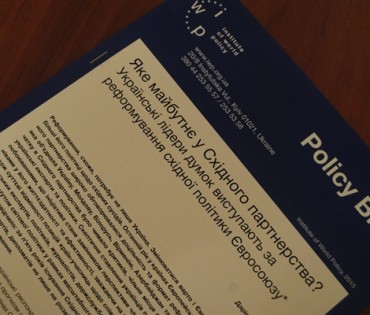Policy brief written by Daria Gaidai, analyst at the Institute of World PolicyUkrainian Opinion Leaders Stand for Reforming the EU’s Eastern Policy
It seems that not only Ukraine requires reforms; the EU, and its policy towards the Eastern neighbors in particular, should also change. The viability and format of reforming the initiative that had united Ukraine, Moldova, Belarus, Armenia, Azerbaijan, and Georgia have been discussed widely in the EU and the Eastern Partnership countries during the last year. The Eastern Partnership initiative had its critics since the very start, and most of those critics were Ukrainian experts and politicians. The Ukrainians’ skepticism could be explained, on the one hand, by their fears that the initiative would become a substitute for the EU membership, and on the other hand, by their worries about the initiative’s viability and efficiency, taking into account the uncertainty of its ultimate goal, as well as significant differences in positions of the member states towards their cooperation with the EU. The survey conducted by the Institute of World Policy among Ukrainian experts, politicians, journalists, civil servants, and public leaders within the large-scale project initiated by the Czech Association for International Affairs (AMO) and supported by the International Visegrad Fund (IVF), has shown that after five years of the Eastern Partnership’s existence concerns and fears expressed previously by Ukrainian experts and diplomats had not vanished but in fact had transformed into clear requirements for its reforming.
In this brief we will consider how Ukrainian respondents rate the performance of the Eastern Partnership in different aspects, their expectations and forecasts of the initiative’s future. A similar surveys conducted within the project in other Eastern Partnership and Visegrad Group countries, allow us to compare the position of Ukrainian opinion leaders with one of their foreign partners and make general conclusions about the prospects of reforming the initiative on the eve of the Eastern Partnership Summit in Riga dubbed as “the survival summit” by the Latvian Minister of Foreign Affairs.
To download policy brief click here.
This policy brief has been developed and presented within the “Initiative for Development of Ukrainian Think Tanks” conducted by the International Renaissance Foundation (IRF) in association with the Think Tank Fund (TTF) with financial support of the Swedish embassy in Ukraine (SIDA).




Comments theme
Comments themeComments themeComments themeComments themeComments themeComments themeComments themeComments themeComments themeComments themeComments themeComments themeComments themeComments themeComments themeComments themeComments themeComments themeComments themeComments.